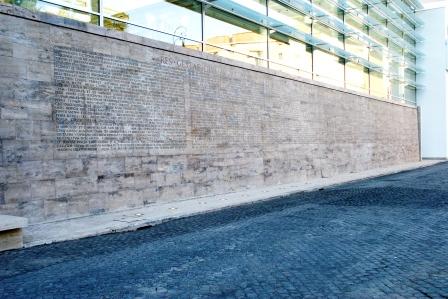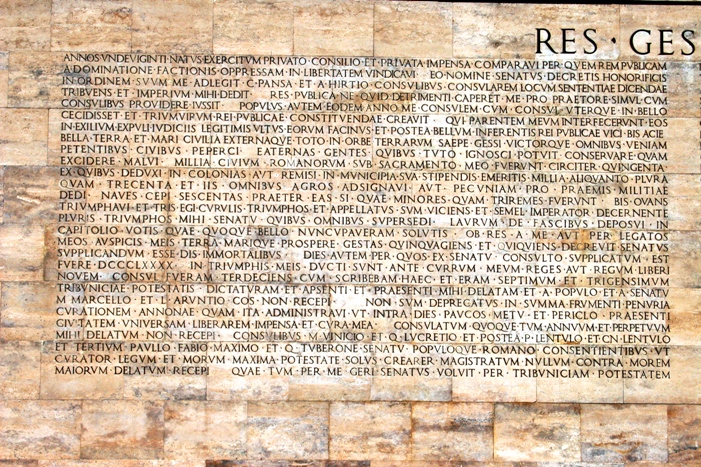 A tip of the biretta to Rogueclassicism for the reminder that today is the anniversary of the dedication of the Ara Pacis in Rome in 13 BC.
A tip of the biretta to Rogueclassicism for the reminder that today is the anniversary of the dedication of the Ara Pacis in Rome in 13 BC.
The Ara Pacis, which has new digs that look rather like a poorly designed gasoline station, now stands hard by the Mausoleum of Augustus Caesar. The long wall of the supporting structure bears the entire Res Gestae Divi Augusti in embedded bronze letters.

The first panel:

Try reading part of it aloud:
Annos undeviginti natus exercitum privato consilio et privata impensa comparavi per quem rem publicam a dominatione factionis oppressam in liberatatem vindicavi.
One of my favorite parts is where Augustus boasts about the accomplishment of closing the doors of the Temple of Janus. These doors were closed only where there was a state of peace. This was probably the occasion of the fullness of time, when the Roman state, so important for the foundation and “culture” of the Catholic Church Christ founded, was at peace… and therefore ready for the birth of our Lord into this our vale of tears.



































It’s not in J. Caesar’s clipped, Hemingway style, but it works. If you want your res gestae to improve your marca (in commercial terms), you need to make it easy for the clientele to understand.
“When I was nineteen, I organized an army with private leadership and expense, with which I delivered to liberty a nation oppressed by a special interest.”
As evidence of “clipped” style, note that Divus Augustus’ ghost writer could have used et…et in the first clause, but did not. Nest, watch the parallells, exercitum…per quem…rem publicam…oppressam…libertatem, and of course, comparavi…vindicavi.
Pax Romana was good for business throughout the Empire. Think about the lost potential farm and trading productivity, as well as loss of life, in the generations of civil war which brought down the Republic.
Salutationes omnibus.
Pingback: Codex Calixtinus Yad Vashem Holocaust Museum Pope Pius XII Prudence | Big Pulpit
One of the things that sprang to mind on (belatedly) reading this, was what Shakespeare made of it (or let Octavius Caesar – in Antony and Cleopatra IV.vi): “The time of universal peace is near. / Prove this a prosp’rous day, the three-nook’d world / Shall bear the olive freely.”
Another was what, in less than a century after 13 B.C., Tacitus, in his Agricola, quotes Calgacus, Chieftain of the Caledonian confederacy as saying: “ubi solitudinem faciunt, pacem appellant”!